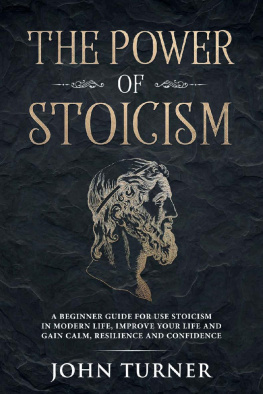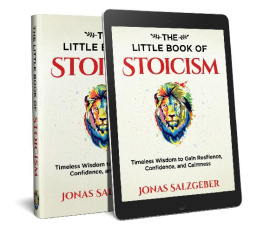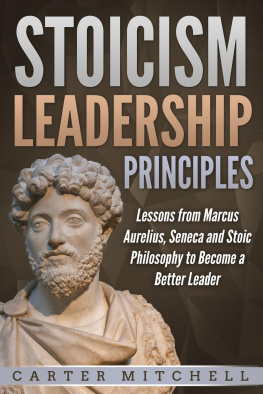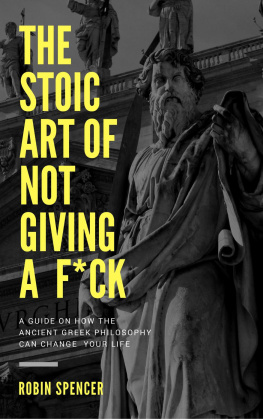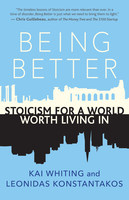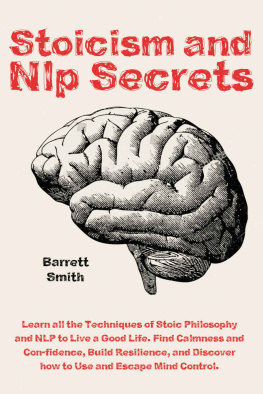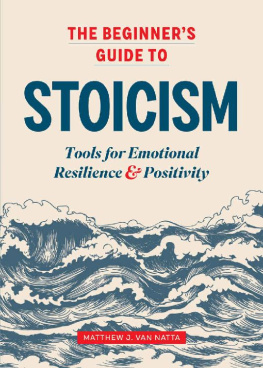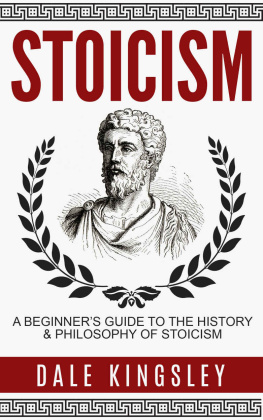The Power
OF
Stoicism
JOHN TURNER
Copyright 2019 John Turner
All rights reserved.
Table of Contents
Introduction
T hanks for choosing this book about Stoicism, Id really love to hear your opinion, so make sure to leave a short review on Amazon if you enjoy it. It means a lot to me!
Stoicism is not some new age trend. If anything, it is a way of life practiced by the Romans thousands of years ago. It was a guide to life back then. But how about our world, the 21st-century one we are living in right now? Can Stoicism be used today? From the 80s up until today, modern day philosophers have all been interested in the works of the founding fathers of Stoicism- Seneca, Nero, Epictetus as well as Marcus Aurelius and the objective is to draw on their ideas and repackage them as guidance to live life in todays environment.
Philosophers of Stoicism today, such as William Irvine, Ryan Holiday and Massimo Pigliucci all, write about the benefits of following the Stoic way of life with the conviction that Stoicism practiced daily is the key to a happy and good life which focuses on our mental state and the virtues of being rational. It explores the Ideal life, a life that is in sync with nature and practicing a calm indifference towards events that are out of our control.
Stoicism is a line of philosophy that involves personal ethics and is indoctrinated along with the principle of logic and its views on the natural world. The school of stoicism was founded in 300 BC Greece by Zeno of Citium and is heavily influenced by the teachings of Socrates.
During this time in Greece, Stoicism was immensely popular and flourished for several hundreds of years as a way to live by the different people of diverse backgrounds in Greece. Because of its philosophy, stoics were considered to be cold, passive and stone like figures.
Despite the phrase to remain stoic or to remain indifferent, the Stoics were anything but indifferent to the reality of life. In truth, they were active participants of the world and they used this philosophy to reason and reach out to others in a state of everlasting joy, tranquility, mental fortitude, and character excellence.
In this book, we will explore the reality of Stoicism, its history and most importantly, the principles of Stoicism.
This book will also attempt to help you use Stoicism in everything you do and weave in Stoic exercises and principles into your daily life.
You will also go through the Stoic view of optimism as well as emotions.
You do not have to baptize yourself a Stoic to practice these values and principles. When you continue reading this book, you will come to understand why. The Greek Stoic philosopher Epictetus put it this way: There is only one way to happiness and that is to cease worrying about things which are beyond the power of our will.
Lets journey into a life philosophy that will help you look at the world a different way. Stoic or not, this philosophy can be practiced at any point in our lives.
Chapter 1
Stoicism Defined
T o give stoicism a definition to better understand it, stoicism can be defined as a way life that teachers a person methods and ways to maintain a rational, calm state of mind no matter what events unfold in front of us.
Stoicism helps us focus on the things that we all can control- our own reaction and actions towards a certain scenario or event. Through this mentality, we can then focus on issues that we can control and not be so worried about the things that we cannot. This is probably why the term to remain stoic was created, which is to remain indifferent no matter what is happening around us. Of course, this definition covers just the tip of the iceberg of what Stoicism is about.
History of Stoicism
Founded in 301 BC, Stoicism has come a long way in its train of thought, infusing thoughts and principles that relate with the modern world. First preachers by Zeno of Citium, a Phoenician merchant Stoicism was first known as Zenonism but eventually became to be known as Stoicism, a change in name based on the location that the followers used to originally meet, which was at Stoa Poikile, also referred to as the Painted Porch.
Followers of this school of philosophy often met in public places where anyone could join the conversation, listen to the preaching and debates. At some point, stoicism was also known as a philosophy of the street, and it was usually ordinary folk who were amongst its biggest followers, together with a small number of aristocrats.
From the get-go and for the next five centuries after that, Stoicism has remained among the most popular and influential schools of philosophy. It is also known as a famous civic discipline in the West and was practiced by all walks of life, all different layers of the community, whether rich or poor. Everyone was in the pursuit of the Good Life.
At some point, Stoicism went under the radar and with it, the core knowledge and principles faded and were almost forgotten until the 1970s when Stoicism was revived again. Stoicism came into the spotlight again because of Cognitive Behavioral Therapy (CBT). Authors like Ryan Holiday and William Irvine used Stoicism philosophical inspiration to write about the need for it in our society today.
Leaders of Stoicism
Famously referred to as the last good emperor, Marcus Aurelius was also the most powerful man on earth at that time. He reflected every evening on the days ongoings and wrote down his thoughts and observations in his diary, which would go on to be published as Meditations. It would become one of the most important, profound and significant sources of Stoic Philosophy.
Born a slave but become a legend, that is the life of Epictetus. Epictetus was also the teacher to other great minds of ancient Rome such as Marcus Aurelius and founded his own school. His teachers have been meticulously recorded by his student, Arrian in the book called Discourses and Enchiridion. Enchiridion, meaning ready at hand is often translated as a handbook and meant to be used like a sword ready to be drawn at the slightest sign of danger or threat. The handbook was a way to deal with lifes challenges.
Seneca was known as many things from Romes best playwright to the wisest broker to Neros tutor and adviser, Senecas personal letters survived and served as some of the most sought-after sources of Stoic philosophy. These manuscripts survived despite being forced to commit suicide by Nero. The documents from these leaders of stoicism form the foundations of Stoicism.
Principles of Stoicism
To understand stoicism is to know its principles.
#1 Living in agreement with Nature
Eudaimonia was the central theme for all ancient schools of philosophy and it was the ultimate goal of life. This ultimate goal of life was the supreme happiness attainable by human beings.
The Good Life that the Stoics refer to summed up the idea as living in agreement with nature. This was the goal and the central slogan of Stoicism.
Living in agreement with nature is about behaving rationally as a human being. We must always aim to live our virtues and apply human reasoning to all our actions. Only when we do this, we truly live in agreement with nature, the way humans are meant to behave.
#2 Living by Virtue
Achieving virtue is the highest good that one can attain as a stoic. There are four cardinal virtues in Stoicism:
- Wisdom or prudence
- Justice or fairness
- Courage or fortitude
- Self-discipline or temperance
Here the term virtue lies in excelling at your own characters strength and applying reason that is in a manner that is both praiseworthy as well as healthy.
Acting according to virtue more often than not, brings about benefits. These benefits, however, should be seen as an added bonus rather than the primary motive for your actions. This is why reasoning comes into play. You always apply reason in order to do the right thing and act according to wisdom, courage, justice, and self-discipline.
Next page
